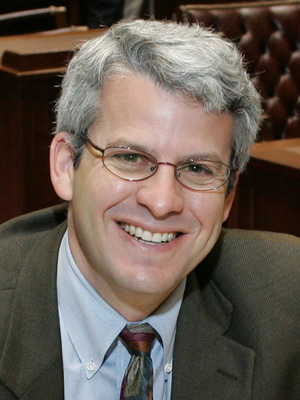
Rep. David Dank co-chairs the task credit task force and presided over Wednesday's meeting.
Kurt Gwartney / KGOU


Rep. David Dank co-chairs the task credit task force and presided over Wednesday's meeting.
Kurt Gwartney / KGOU
The state tax credit task force met again Wednesday and took on a trio on incentive programs and investment procedures.
The OCIB’s incentives were defended by its president, Devon Sauzek, who took heat from several members of the task force, as well as the Oklahoma Council of Public Affairs. Sauzek wanted the tax credits extended to 2030. The tax credits sunset in 2015. The OCPA’s fiscal policy director, Jonathan Small, said the OCIB isn’t a core function of government, violates the idea of free enterprise, and is basically an example of the government picking “winners and losers.”
And that was all before lunch.
The afternoon session focused on the two venture capital incentives. Former State Treasurer Scott Meacham, who’s now with the State Chamber of Oklahoma — and who had a hand in the current tax credit moratorium, which ends in June 2012 — gave a presentation about ways to make the programs viable.
We counted at least five big takeaways from the meeting. The next one is slated for Sept. 7, and the views that evolve from the Task Force for the Study of State Tax Credits and Economic Incentives will frame much of the budget discussion for the 2012 legislative session.
1. Incentives Can Work
State Rep. David Dank (R-Oklahoma City), who co-chairs the task force, summed up the tax credit debate in simple terms: Is it a good deal for taxpayers? Do the benefits exceed the cost to taxpayers? “We know what tax credits work,” Dank said, citing the Quality Jobs Act and the recently constitutionally challenged Quick Action Closing Fund.

Kurt Gwartney / KGOU
Rep. David Dank (R-Oklahoma City) co-chairs the task credit task force and presided over Wednesday's meeting.
Under the jobs act, qualifying companies that create new jobs in Oklahoma can get a quarterly rebate of up to 5 percent of taxes for 10 years. The closing fund, made possible by House Bill 1953, goes into effect this month, and authorizes the governor to make the final decision on a project after consulting the Speaker of the House and the Senate president pro tem.
2. Transparency is Key
Rep. Dank said it in his opening statement: “Transparency is essential.” This was a thesis repeated throughout the meeting, both by Dank, and by other members of the task force. Rep. Earl Sears (R-Bartlesville) asked about the OCIB’s payroll; State Auditor and Inspector Gary Jones asked Sauzek about his salaries, both before and after the trust’s privatization in 2000: $65,000 and $360,000, respectively.
Jones routinely asked for more clarity on auditing procedures and basic accountability. He asked Sauzek who was responsible for creating their numbers on jobs and payroll, and pressed the OCIB president on what information they’d share on investments, and what kind of investment information would be considered proprietary.
3. The Money Must Stay in Oklahoma
State Sen. Andrew Rice (D-Oklahoma City) asked Sauzek how much funding goes to Oklahoma companies and how much goes out-of-state. The answer: it depends. Some funds may direct 30 percent; other, smaller funds only feed Oklahoma companies.

Oklahoma Senate
A venture capitalist himself, Sen. Tom Adelson (D-Tulsa) questioned OCIB's in-state investments.
Sen. Tom Adelson (D-Tulsa) painted a grim picture of OCIB’s in-state investments, saying that only 4 cents per dollar invested by the trust went to Oklahoma startups. Out of the 216 companies receiving money, only 25-26 were located in Oklahoma, Adelson — a venture capitalist himself — said. Rep. Sears asked Sauzek if the OCIB ever even discussed funding staying in Oklahoma.
4. It’s All About Jobs
Rep. Dank repeated this mantra throughout Wednesday’s meeting. “The way to grow Oklahoma is through job growth.” Gov. Mary Fallin agrees. In his opening remarks, Dank said that from now on, the first test of an effective incentive is the tally of jobs it’s created.
Dank asked Meacham about what kind of safeguards could be installed to ensure that re-jiggered Small Business and Rural Venture Capital Formation Incentives actually created jobs. Rep. Mike Reynolds (R-Oklahoma City) had a lot to say about jobs (more on that below).
5. Mike Reynolds is on a Mission
The Representative from Oklahoma City said he’s had some of the tax credits in his crosshairs for years. He’s been stockpiling records and documents. He told CapitolBeatOK’s Patrick B. McGuigan that his investigations into OCIB alone account for “70 percent of the paper stacks you see in my office.” Reynolds told Sauzek he went through 8,000 pages of information and was only able to verify that 18 jobs were created with OCIB funds.

Oklahoma House of Representatives
Rep. Mike Reynolds (R-Oklahoma City) went after the OCIB and both venture capital incentives.
Reynolds told Sauzek he is asking the Attorney General about the OCIB’s claim that return-on-investment numbers and investment amounts are proprietary information. “We suspect it’s not proprietary,” Reynolds said.
Reynolds went on about the Oklahoma companies funded by the OCIB, two or three of which he said are centered on research scientists at the University of Oklahoma. “They’ve discovered some things,” Reynolds said, adding that taxpayer funds are used for interns and buildings before the companies are shipped off to California.
Reynolds also took on the two venture capital formation incentives. When he looked into those incentives a few years ago, he found that 94 jobs had been created. The incentive program, Reynolds said, “is a sham. It needs to be shut down.”